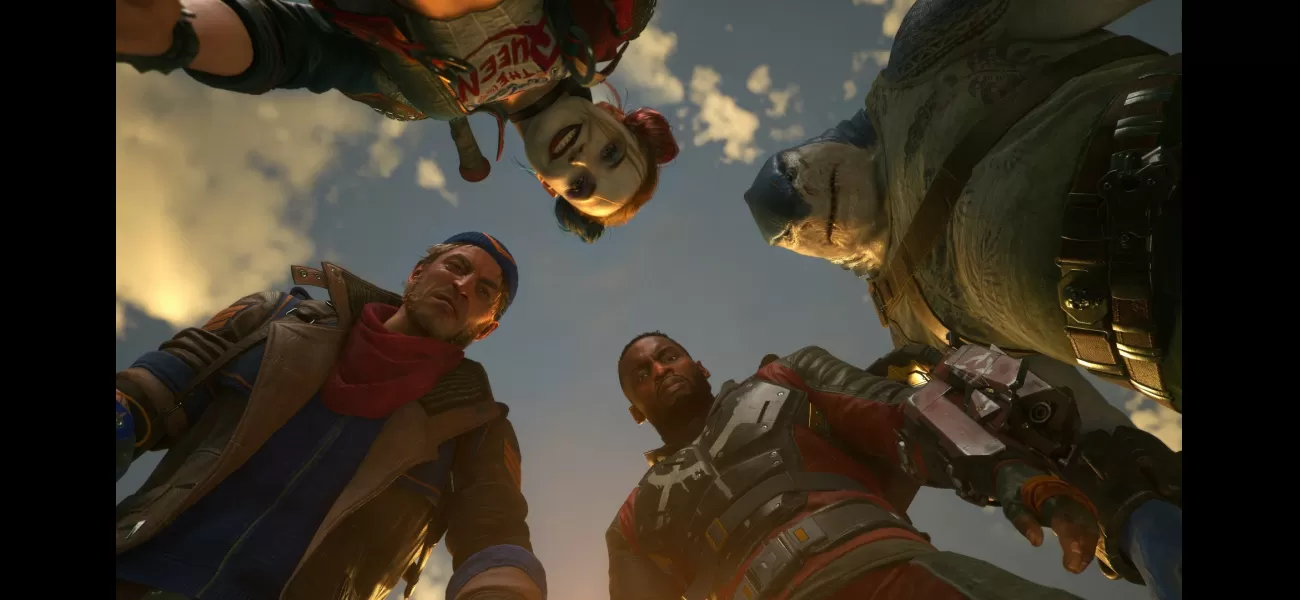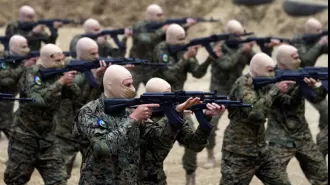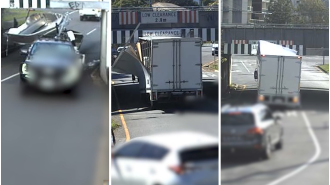Task Force X takes on their toughest mission yet as they are forced to take down their former allies in this highly-anticipated game.
New Batman game has four-player online co-op and turns supervillains into heroes.
February 6th 2024.

Suicide Squad: Kill The Justice League is finally out, after a long wait since the release of Batman: Arkham Knight. This game, with its four-player online co-op gameplay, aims to make supervillains into heroes.
To be honest, we all saw this coming. The signs were there, especially when the studio heads left Rocksteady last year during the nine-month long delay for Suicide Squad. They never explained what they were doing during that time, but reports suggest that there were no major changes made to the gameplay or structure. In all honesty, even a year wouldn’t have been enough to make significant changes in a modern game of this scale. Sadly, most of Suicide Squad’s flaws run deep.
The concept for this game was probably conceived around the time of Batman: Arkham Knight’s release in 2015. During that time, loot boxes were the hot new gimmick for publishers. They looked at the success of FIFA and other sports games and realized they could add similar systems to ordinary games, even single-player titles, and reap the same rewards. The original Destiny, released in 2014, was also likely a major influence, as it was for Marvel’s Avengers.
The loot box fad continued for several years, but after gamers soundly rejected Star Wars: Battlefront 2 in 2017, loot boxes became a liability rather than a cash cow. In 2018, even Warner Bros., the publisher of Suicide Squad, removed them from Middle-Earth: Shadow Of War. But this was around the same time that Fortnite was becoming a global phenomenon, and suddenly publishers had a new bandwagon to jump on with live service games. However, people are now starting to turn against these as well.
It’s important to understand this timeline in order to comprehend where Suicide Squad is coming from and why much of it feels old-fashioned and half-formed. Rocksteady has been trying to pivot away from a dying trend not once, but twice.
We summarized our first impressions of the game in our initial review in progress, but the set-up is quite simple. Supervillain Brainiac invades Metropolis and gains mind control over most of the Justice League. So, we get the evil Superman trope yet again, as if it wasn’t already a tired enough idea in Injustice.
In response to this crisis, the US government calls in Task Force X, also known as the Suicide Squad. This team consists of not-that-evil supervillains who receive a commuted sentence for carrying out secret government missions. To ensure they follow orders, bombs are implanted in their heads. However, they are not exactly supervillains, since none of them have any superpowers. The squad consists of four members: Harley Quinn, Deadshot, Captain Boomerang, and King Shark.
Since they lack superpowers, they rely on guns and pretend to be third-person shooter characters. However, in the comics, only Deadshot regularly uses guns. It’s a very simplistic use of the license, similar to every movie from the 16-bit era being turned into a platformer. It’s even more bizarre because all the guns are interchangeable, meaning they are not unique to each character, and there’s no class system.
The only powers that resemble something superhero-like are related to traversal. Metropolis is a very vertical city, with an absurdly impractical layout. Thanks to equipment stolen at the start of the game, Deadshot gets a jetpack, Harley can swing on a drone she stole from Batman, Boomerang can teleport a distance, and King Shark can jump like the Hulk.
The game’s script is inconsistent, but there are some good gags. The standout character is Captain Boomerang, portrayed as an amoral scumbag who sounds exactly like Bluey’s dad. The other characters are much more honorable and would never dream of referring to Wonder Woman as Wonder Shelia.
Deadshot is almost entirely a blank slate, while Harley Quinn is the least interesting portrayal we’ve seen of her character. She has been obnoxious and over-the-top plenty of times, but never quite this dull. Shark is good fun, though, even though it’s clear he is the end result of someone asking, ‘what if Drax, from the Guardians Of The Galaxy movies, was smart?’
Suicide Squad doesn’t even attempt to have any genuine emotional moments or serious story beats. It almost entirely overlooks the fact that it is technically a sequel to Arkham Knight. The most overt reference we could find is an easily missed museum exhibit voiceover. We refuse to believe this was where the game’s ending was originally leading.
The story is not good enough to recommend the game, especially as it is surprisingly short. However, it is compelling while it lasts, with lots of well-orchestrated cutscenes. The visuals of Suicide Squad are a mixed bag, but the facial animation is the best we’ve ever seen. It’s a shame it doesn’t get anything more dramatic to work with.
Deadshot is the most fun character to play as, but also the most boring one. Once you get past the story or start exploring the edges, the game starts to fall apart. As intricately designed as Metropolis is, there is almost nothing in it other than random alien patrols and some very uninspired Riddler challenges. You select a mission from the map and go there as directly as possible, rendering the fact that you’re in an open-world environment almost irrelevant.
When you reach the mission, you quickly realize they are all the same, with only minor variations that are repeated ad nauseam. Sometimes, you just shoot everything, while other times you take down generators and power supplies, collect ‘data’ from downed enemies, or rescue civilians to take them back to a flying bus. There are the occasional escort missions and ones where you drive a flying car, but they are equally uninspired and usually very brief.
The missions seem almost like mini-games, a part of a larger whole, and yet there is nothing else to the game. You shoot the same group of awful-looking bad guys for slightly different reasons, and that’s it.
Suicide Squad gets many things wrong, but perhaps the most surprising failure is how bad of a live service game it is. The four-player co-op works fine and is certainly a draw, but the guns never do anything different other than adding elemental damage. We speculate that the game used to be more overtly a live service title, where the loot and different guns made much more difference and were more heavily monetized. However, as it is now, getting a new weapon feels like a minor reward – just a bit of busywork on the loadout screen, rather than something you need or can get excited about.
In the end, Suicide Squad feels small and inconsequential. The missions almost feel like mini-games, and there is nothing else to the game. You shoot the same group of bad guys with awful-looking character models for slightly different reasons, and that’s it. It’s a really weird concept for a Suicide Squad game.
The Suicide Squad is finally here and it's time to discuss the highly-anticipated video game, Suicide Squad: Kill The Justice League. This four-player online co-op game has been in the works for quite some time now and it's finally out for everyone to play. But let's be real, we all saw this coming. With the studio heads leaving the company last year and multiple delays, it was clear that the game wasn't going to be an easy feat. From loot boxes to the rise of live service games, Suicide Squad has had to navigate through the ever-changing landscape of the gaming industry. And sadly, the game still falls short despite its efforts.
Back in 2015, loot boxes were all the rage among publishers. Games like FIFA and other sports titles were incorporating them into their games and reaping the rewards. Even the popular game Destiny from 2014 had a major influence on the industry. But after the disastrous reception of Star Wars: Battlefront 2 in 2017, loot boxes quickly became a liability rather than a cash cow. Warner Bros., the publisher of Suicide Squad, even removed them from their game Middle-Earth: Shadow Of War in 2018. However, the rise of live service games, like Fortnite, became the new trend for publishers to jump on. But now, even these games are starting to lose their appeal among gamers.
This timeline is crucial in understanding the direction of Suicide Squad and why it feels outdated and unfinished. The game was clearly trying to pivot away from dying trends, not once, but twice. Our initial review in progress highlighted some of the game's issues, but let's delve into it further. The game's premise is simple, with supervillain Brainiac invading Metropolis and gaining mind control over most of the Justice League. So, yet again, we have the evil Superman trope, which has been done to death in other games like Injustice.
The US government's response to this is to enlist the help of Task Force X, also known as the Suicide Squad. This team of not-so-evil supervillains is promised a reduced sentence if they carry out secret government missions. But to ensure their compliance, a bomb is implanted in their heads. However, none of the characters have any superpowers, and there are only four of them: Harley Quinn, Deadshot, Captain Boomerang, and King Shark.
Without any superpowers, the characters are forced to rely on guns, which goes against the traditional portrayal of these characters in the comics. This simplistic use of the license is similar to turning every movie from the 16-bit era into a platformer. What's more, the characters' guns are interchangeable, and there's no class system, making them all feel like generic shooter characters. The only slight hint of superhero abilities comes from their traversal skills. Deadshot has a jetpack, Harley can swing on a drone, Boomerang can teleport, and King Shark can jump far distances like the Hulk.
The game's script is inconsistent, but there are some good jokes, with Captain Boomerang being the standout character with his portrayal as an amoral scumbag. The other characters are much more honorable and wouldn't dare refer to Wonder Woman as "Wonder Shelia." Deadshot is a blank slate, and Harley Quinn's portrayal is uncharacteristically dull. King Shark is the most enjoyable to play as, but he's essentially a smart version of Drax from the Guardians Of The Galaxy movies.
Suicide Squad doesn't attempt to have any emotional or serious moments and barely acknowledges its status as a sequel to Arkham Knight. The only obvious reference we found was a voiceover in a museum exhibit, which we refuse to believe is where the previous game's ending was leading. The story is not strong enough to carry the game, especially considering its surprisingly short length. However, the cut scenes are well-orchestrated, and the facial animations are the best we've seen, but it's a shame they don't have more dramatic material to work with.
Once you move past the story, the game starts to fall apart. While Metropolis is intricately designed, there's very little to do in it other than fighting random alien patrols and completing uninteresting Riddler challenges. This makes the open-world environment feel almost irrelevant. The missions are all essentially the same, with minor variations that quickly become repetitive. You either shoot everything, take down generators and power supplies, collect data from enemies, or rescue civilians. There are some brief escort missions and driving sequences, but they offer no real variation or excitement.
The missions seem like they were handcrafted, but as the game progresses, it becomes clear that they're just slightly altered versions of the same objective. To make matters worse, the boss battles are uninteresting and lack creativity. Despite having solid combat mechanics, the game feels small and inconsequential. The missions feel like mini-games rather than part of a larger experience, and there's nothing else to the game. You fight the same enemies for slightly different reasons, and that's all there is to it.
One of the most surprising failures of Suicide Squad is how poorly it functions as a live service game. While the four-player co-op works well, the guns don't offer much variety other than elemental damage. Crafting new weapons feels like a chore, and you'll likely find yourself sticking to the weapons you acquire from completing missions. It seems like the game was originally designed to be a more overtly live service title, but that aspect was abandoned and left with minor rewards and little impact on gameplay.
In conclusion, Suicide Squad: Kill The Justice League falls short of expectations. The game tries to keep up with ever-changing trends in the gaming industry, but it ultimately fails to deliver an engaging and substantial experience. The story is unremarkable, the missions are repetitive, and the game's mechanics are solid but not enough to make up for its shortcomings. Perhaps the game's most significant fault is its failure as a live service game, which could have added more depth and longevity to the experience.
To be honest, we all saw this coming. The signs were there, especially when the studio heads left Rocksteady last year during the nine-month long delay for Suicide Squad. They never explained what they were doing during that time, but reports suggest that there were no major changes made to the gameplay or structure. In all honesty, even a year wouldn’t have been enough to make significant changes in a modern game of this scale. Sadly, most of Suicide Squad’s flaws run deep.
The concept for this game was probably conceived around the time of Batman: Arkham Knight’s release in 2015. During that time, loot boxes were the hot new gimmick for publishers. They looked at the success of FIFA and other sports games and realized they could add similar systems to ordinary games, even single-player titles, and reap the same rewards. The original Destiny, released in 2014, was also likely a major influence, as it was for Marvel’s Avengers.
The loot box fad continued for several years, but after gamers soundly rejected Star Wars: Battlefront 2 in 2017, loot boxes became a liability rather than a cash cow. In 2018, even Warner Bros., the publisher of Suicide Squad, removed them from Middle-Earth: Shadow Of War. But this was around the same time that Fortnite was becoming a global phenomenon, and suddenly publishers had a new bandwagon to jump on with live service games. However, people are now starting to turn against these as well.
It’s important to understand this timeline in order to comprehend where Suicide Squad is coming from and why much of it feels old-fashioned and half-formed. Rocksteady has been trying to pivot away from a dying trend not once, but twice.
We summarized our first impressions of the game in our initial review in progress, but the set-up is quite simple. Supervillain Brainiac invades Metropolis and gains mind control over most of the Justice League. So, we get the evil Superman trope yet again, as if it wasn’t already a tired enough idea in Injustice.
In response to this crisis, the US government calls in Task Force X, also known as the Suicide Squad. This team consists of not-that-evil supervillains who receive a commuted sentence for carrying out secret government missions. To ensure they follow orders, bombs are implanted in their heads. However, they are not exactly supervillains, since none of them have any superpowers. The squad consists of four members: Harley Quinn, Deadshot, Captain Boomerang, and King Shark.
Since they lack superpowers, they rely on guns and pretend to be third-person shooter characters. However, in the comics, only Deadshot regularly uses guns. It’s a very simplistic use of the license, similar to every movie from the 16-bit era being turned into a platformer. It’s even more bizarre because all the guns are interchangeable, meaning they are not unique to each character, and there’s no class system.
The only powers that resemble something superhero-like are related to traversal. Metropolis is a very vertical city, with an absurdly impractical layout. Thanks to equipment stolen at the start of the game, Deadshot gets a jetpack, Harley can swing on a drone she stole from Batman, Boomerang can teleport a distance, and King Shark can jump like the Hulk.
The game’s script is inconsistent, but there are some good gags. The standout character is Captain Boomerang, portrayed as an amoral scumbag who sounds exactly like Bluey’s dad. The other characters are much more honorable and would never dream of referring to Wonder Woman as Wonder Shelia.
Deadshot is almost entirely a blank slate, while Harley Quinn is the least interesting portrayal we’ve seen of her character. She has been obnoxious and over-the-top plenty of times, but never quite this dull. Shark is good fun, though, even though it’s clear he is the end result of someone asking, ‘what if Drax, from the Guardians Of The Galaxy movies, was smart?’
Suicide Squad doesn’t even attempt to have any genuine emotional moments or serious story beats. It almost entirely overlooks the fact that it is technically a sequel to Arkham Knight. The most overt reference we could find is an easily missed museum exhibit voiceover. We refuse to believe this was where the game’s ending was originally leading.
The story is not good enough to recommend the game, especially as it is surprisingly short. However, it is compelling while it lasts, with lots of well-orchestrated cutscenes. The visuals of Suicide Squad are a mixed bag, but the facial animation is the best we’ve ever seen. It’s a shame it doesn’t get anything more dramatic to work with.
Deadshot is the most fun character to play as, but also the most boring one. Once you get past the story or start exploring the edges, the game starts to fall apart. As intricately designed as Metropolis is, there is almost nothing in it other than random alien patrols and some very uninspired Riddler challenges. You select a mission from the map and go there as directly as possible, rendering the fact that you’re in an open-world environment almost irrelevant.
When you reach the mission, you quickly realize they are all the same, with only minor variations that are repeated ad nauseam. Sometimes, you just shoot everything, while other times you take down generators and power supplies, collect ‘data’ from downed enemies, or rescue civilians to take them back to a flying bus. There are the occasional escort missions and ones where you drive a flying car, but they are equally uninspired and usually very brief.
The missions seem almost like mini-games, a part of a larger whole, and yet there is nothing else to the game. You shoot the same group of awful-looking bad guys for slightly different reasons, and that’s it.
Suicide Squad gets many things wrong, but perhaps the most surprising failure is how bad of a live service game it is. The four-player co-op works fine and is certainly a draw, but the guns never do anything different other than adding elemental damage. We speculate that the game used to be more overtly a live service title, where the loot and different guns made much more difference and were more heavily monetized. However, as it is now, getting a new weapon feels like a minor reward – just a bit of busywork on the loadout screen, rather than something you need or can get excited about.
In the end, Suicide Squad feels small and inconsequential. The missions almost feel like mini-games, and there is nothing else to the game. You shoot the same group of bad guys with awful-looking character models for slightly different reasons, and that’s it. It’s a really weird concept for a Suicide Squad game.
The Suicide Squad is finally here and it's time to discuss the highly-anticipated video game, Suicide Squad: Kill The Justice League. This four-player online co-op game has been in the works for quite some time now and it's finally out for everyone to play. But let's be real, we all saw this coming. With the studio heads leaving the company last year and multiple delays, it was clear that the game wasn't going to be an easy feat. From loot boxes to the rise of live service games, Suicide Squad has had to navigate through the ever-changing landscape of the gaming industry. And sadly, the game still falls short despite its efforts.
Back in 2015, loot boxes were all the rage among publishers. Games like FIFA and other sports titles were incorporating them into their games and reaping the rewards. Even the popular game Destiny from 2014 had a major influence on the industry. But after the disastrous reception of Star Wars: Battlefront 2 in 2017, loot boxes quickly became a liability rather than a cash cow. Warner Bros., the publisher of Suicide Squad, even removed them from their game Middle-Earth: Shadow Of War in 2018. However, the rise of live service games, like Fortnite, became the new trend for publishers to jump on. But now, even these games are starting to lose their appeal among gamers.
This timeline is crucial in understanding the direction of Suicide Squad and why it feels outdated and unfinished. The game was clearly trying to pivot away from dying trends, not once, but twice. Our initial review in progress highlighted some of the game's issues, but let's delve into it further. The game's premise is simple, with supervillain Brainiac invading Metropolis and gaining mind control over most of the Justice League. So, yet again, we have the evil Superman trope, which has been done to death in other games like Injustice.
The US government's response to this is to enlist the help of Task Force X, also known as the Suicide Squad. This team of not-so-evil supervillains is promised a reduced sentence if they carry out secret government missions. But to ensure their compliance, a bomb is implanted in their heads. However, none of the characters have any superpowers, and there are only four of them: Harley Quinn, Deadshot, Captain Boomerang, and King Shark.
Without any superpowers, the characters are forced to rely on guns, which goes against the traditional portrayal of these characters in the comics. This simplistic use of the license is similar to turning every movie from the 16-bit era into a platformer. What's more, the characters' guns are interchangeable, and there's no class system, making them all feel like generic shooter characters. The only slight hint of superhero abilities comes from their traversal skills. Deadshot has a jetpack, Harley can swing on a drone, Boomerang can teleport, and King Shark can jump far distances like the Hulk.
The game's script is inconsistent, but there are some good jokes, with Captain Boomerang being the standout character with his portrayal as an amoral scumbag. The other characters are much more honorable and wouldn't dare refer to Wonder Woman as "Wonder Shelia." Deadshot is a blank slate, and Harley Quinn's portrayal is uncharacteristically dull. King Shark is the most enjoyable to play as, but he's essentially a smart version of Drax from the Guardians Of The Galaxy movies.
Suicide Squad doesn't attempt to have any emotional or serious moments and barely acknowledges its status as a sequel to Arkham Knight. The only obvious reference we found was a voiceover in a museum exhibit, which we refuse to believe is where the previous game's ending was leading. The story is not strong enough to carry the game, especially considering its surprisingly short length. However, the cut scenes are well-orchestrated, and the facial animations are the best we've seen, but it's a shame they don't have more dramatic material to work with.
Once you move past the story, the game starts to fall apart. While Metropolis is intricately designed, there's very little to do in it other than fighting random alien patrols and completing uninteresting Riddler challenges. This makes the open-world environment feel almost irrelevant. The missions are all essentially the same, with minor variations that quickly become repetitive. You either shoot everything, take down generators and power supplies, collect data from enemies, or rescue civilians. There are some brief escort missions and driving sequences, but they offer no real variation or excitement.
The missions seem like they were handcrafted, but as the game progresses, it becomes clear that they're just slightly altered versions of the same objective. To make matters worse, the boss battles are uninteresting and lack creativity. Despite having solid combat mechanics, the game feels small and inconsequential. The missions feel like mini-games rather than part of a larger experience, and there's nothing else to the game. You fight the same enemies for slightly different reasons, and that's all there is to it.
One of the most surprising failures of Suicide Squad is how poorly it functions as a live service game. While the four-player co-op works well, the guns don't offer much variety other than elemental damage. Crafting new weapons feels like a chore, and you'll likely find yourself sticking to the weapons you acquire from completing missions. It seems like the game was originally designed to be a more overtly live service title, but that aspect was abandoned and left with minor rewards and little impact on gameplay.
In conclusion, Suicide Squad: Kill The Justice League falls short of expectations. The game tries to keep up with ever-changing trends in the gaming industry, but it ultimately fails to deliver an engaging and substantial experience. The story is unremarkable, the missions are repetitive, and the game's mechanics are solid but not enough to make up for its shortcomings. Perhaps the game's most significant fault is its failure as a live service game, which could have added more depth and longevity to the experience.
[This article has been trending online recently and has been generated with AI. Your feed is customized.]
[Generative AI is experimental.]
0
0
Submit Comment





